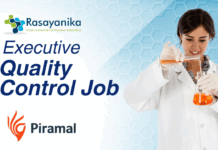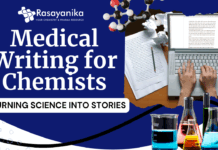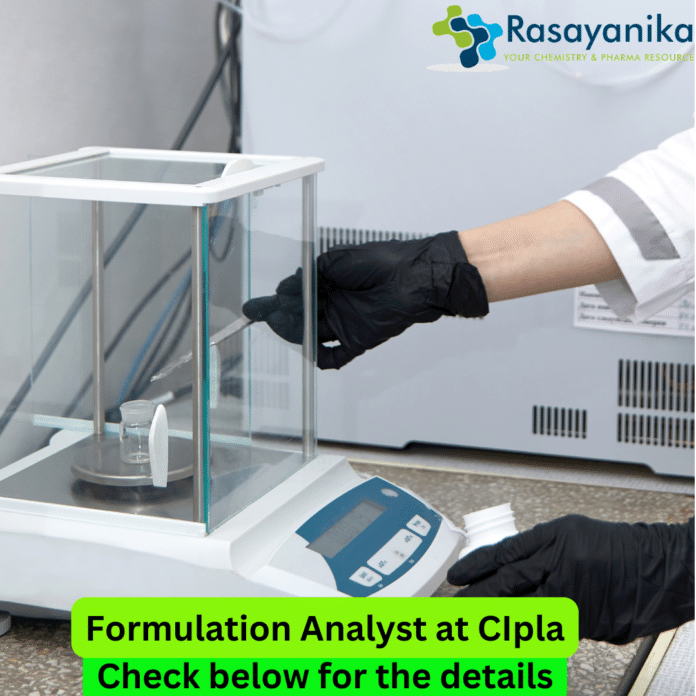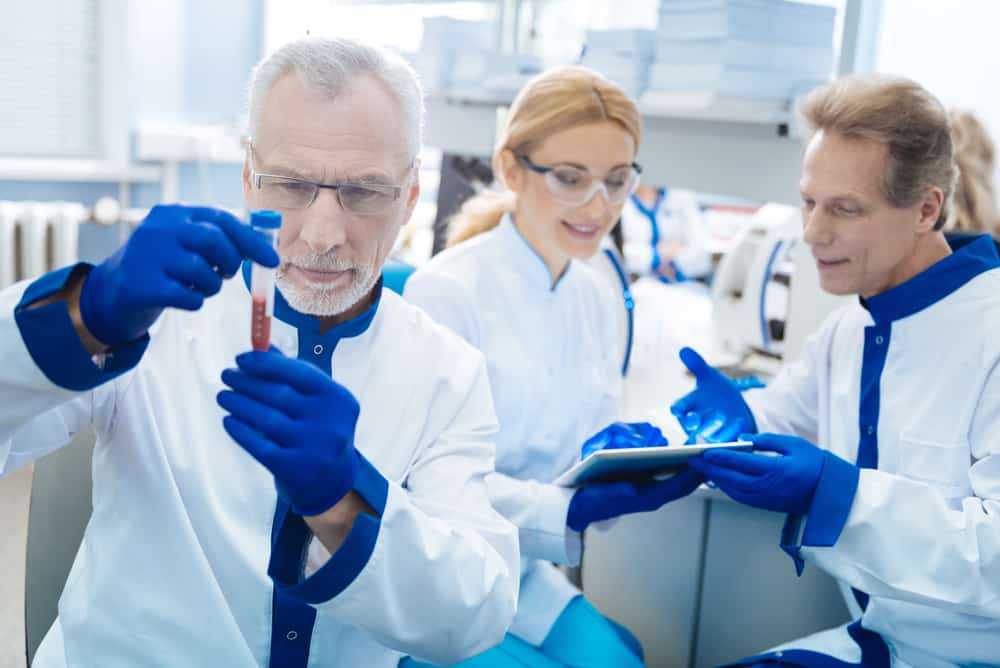CIpla analytical role for MSc candidates. MSc Analytical Chemistry Job details are given below. Apply now if you find it interesting. Eligible candidates apply now for the MSc Analytical Chemistry job opening.
Job role – Formulation ADL – Analyst
Job Purpose-
Execute the core method development activities and conduct analysis of routine as well as stability samples to finalize specifications and ensure timely delivery of the product to the unit.
Key Accountabilities of MSc Analytical Chemistry Job-
- Develop new analytical methods for the analysis of routine as well as stability samples by following proper GLPs to provide results or information regarding products to formulators
- Perform maintenance and calibration of lab instruments/equipment to get accurate and reproducible analytical results for proper interpretation
- Document and interpret the analytical data in a timely manner as per GLP / GMP requirements to maintain records and compliance with regulatory norms
- Provide support to units or CFTs for transfer of analytical methods and techniques by visiting and demonstrating them with the relevant analysis to ensure successful and timely transfer of products
- Maintain proper safety, GLP, and GMP environment in the workplace to minimize accidents and incidents
- Review the analytical requirements and recommend corrections in specifications by coordinating with units and CFTs to ensure smooth operations
Education Qualification – M. Sc. (Analytical Chemistry) / M. Pharm
- Relevant Work Experience –
2-4 years of experience in a pharmaceutical organisation with knowledge of handling instruments like HPLC, GC, Dissolution tester and DPI-related instruments - Knowledge of current guidelines like ICH, EMEA, WHO
Greetings! We’ve assembled a collection of interview questions and well-crafted answers to support your interview preparation. These materials are intended to enhance your confidence and increase your chances of success during your upcoming interview of MSc Analytical Chemistry Job. Wishing you the best of luck!
Can you describe your experience in developing new analytical methods for routine and stability sample analysis?
Answer: During my previous role in a pharmaceutical organization, I was actively involved in developing analytical methods for routine and stability sample analysis. I followed Good Laboratory Practices (GLPs) meticulously to ensure the accuracy and reliability of the methods. These methods played a vital role in providing critical information to formulators and contributed to the successful formulation of products.
How do you ensure that lab instruments and equipment are maintained and calibrated to obtain accurate and reproducible analytical results?
Answer: Instrument maintenance and calibration are crucial for reliable results. I have a systematic approach to this. I schedule regular maintenance based on manufacturer’s recommendations, and I perform calibrations following established procedures. Additionally, I keep detailed records of maintenance and calibration activities to track instrument performance and address any deviations promptly.
Could you provide an example of a situation where you had to interpret analytical data in compliance with GLP/GMP requirements and maintain accurate records?
Answer: In my previous role, I conducted stability testing on a drug product. It required me to interpret analytical data in strict compliance with GLP and GMP guidelines. I maintained meticulous records of the tests performed, ensuring traceability and accuracy. This practice was crucial for regulatory compliance and maintaining data integrity.
How do you approach transferring analytical methods and techniques to units or cross-functional teams (CFTs)? Can you share an experience where you successfully facilitated such a transfer?
Answer: I approach method transfer by collaborating closely with the receiving teams. I visit the units and provide hands-on demonstrations, ensuring that the teams understand the analytical techniques and methods. In a recent project, I facilitated the transfer of a complex HPLC method to a production unit, and through effective communication and training, the method was successfully implemented without disruptions.
How do you prioritize safety, GLP, and GMP in your work environment? Can you give an example of how you ensured a safe and compliant workplace in your previous role?
Answer: Safety, GLP, and GMP are non-negotiable priorities in my work. To ensure a safe and compliant workplace, I conduct regular safety training for lab personnel, maintain proper documentation, and implement safety protocols. In my previous role, I identified and rectified potential safety hazards in the lab, such as chemical storage improvements, which enhanced overall safety and compliance.















































